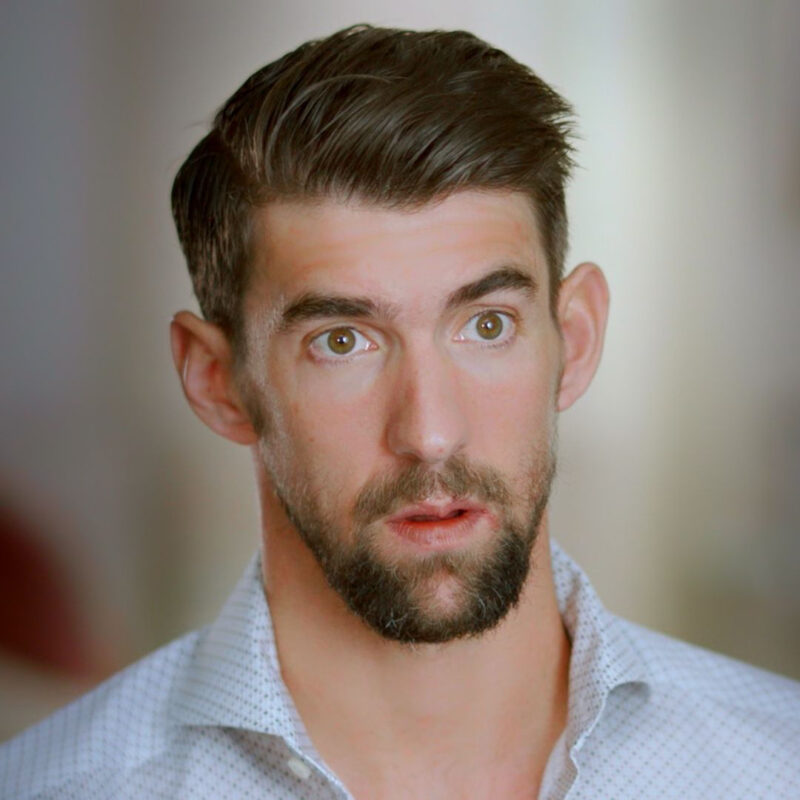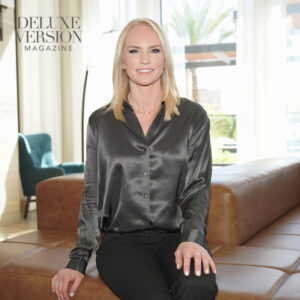Michael Phelps: The Weight of Gold
Michael Phelps Gets Candid About His Struggles in the Spotlight
– By Allison Kugel
With his unmatched agility and speed in the water, Michael Phelps holds the all-time record for Olympic gold medals earned. The closest thing to Aquaman, on two legs, Phelps, like many pro-athletes who have reached his rarified status, was placed on a pedestal that was unsustainable.
For more than a decade, Michael Phelps’ life was a relentless march towards breaking Olympic records, out-swimming his competition as he trained and traveled the world collecting gold medals and corporate endorsement deals. His seemingly flawless athleticism and boy-next-door charm made him seem unstoppable. The “bloom” first came off the rose in 2004, when Phelps was arrested for driving under the influence. That embarrassing event was compounded in 2009, when pictures of Phelps allegedly smoking from a bong went viral, finding their way into mass tabloid circulation. The final nail in the coffin for Phelps was a second DUI in 2014, which he now describes as “the bottom of my bottom,” leading to deep depression and spurning him to seek help for issues that had plagued him since his younger years. The rough road to redemption ultimately instilled a passion in Michael Phelps for mental health awareness and advocacy.
Rejecting a tragic end to his story, Phelps dusted himself off and made his comeback at the 2016 Summer Olympics, breaking further records and winning over fans who had doubted him.
Now, a devoted husband and father of three boys, Phelps insists that the second chapter of his life will make his storied time in the water look like a dress rehearsal for what’s to come. Through his Phelps Foundation, he tirelessly champions the sport of swimming, fitness initiatives, and healthy lifestyle choices for young people. Phelps continues to dedicate his time and resources to a cause close to his heart, that of mental health research and awareness.
The Weight of Gold, an HBO Sports documentary film, executive produced and narrated by Phelps, delves into the lives and careers of celebrated Olympians as it unpacks the mental health ramifications of the long term, restrictive and singularly focused pursuit of Olympic greatness and stardom that Phelps has achieved. According to HBO, “The Weight of Gold seeks to inspire discussion about mental health issues, encourage people to seek help, and highlight the need for readily available support.”
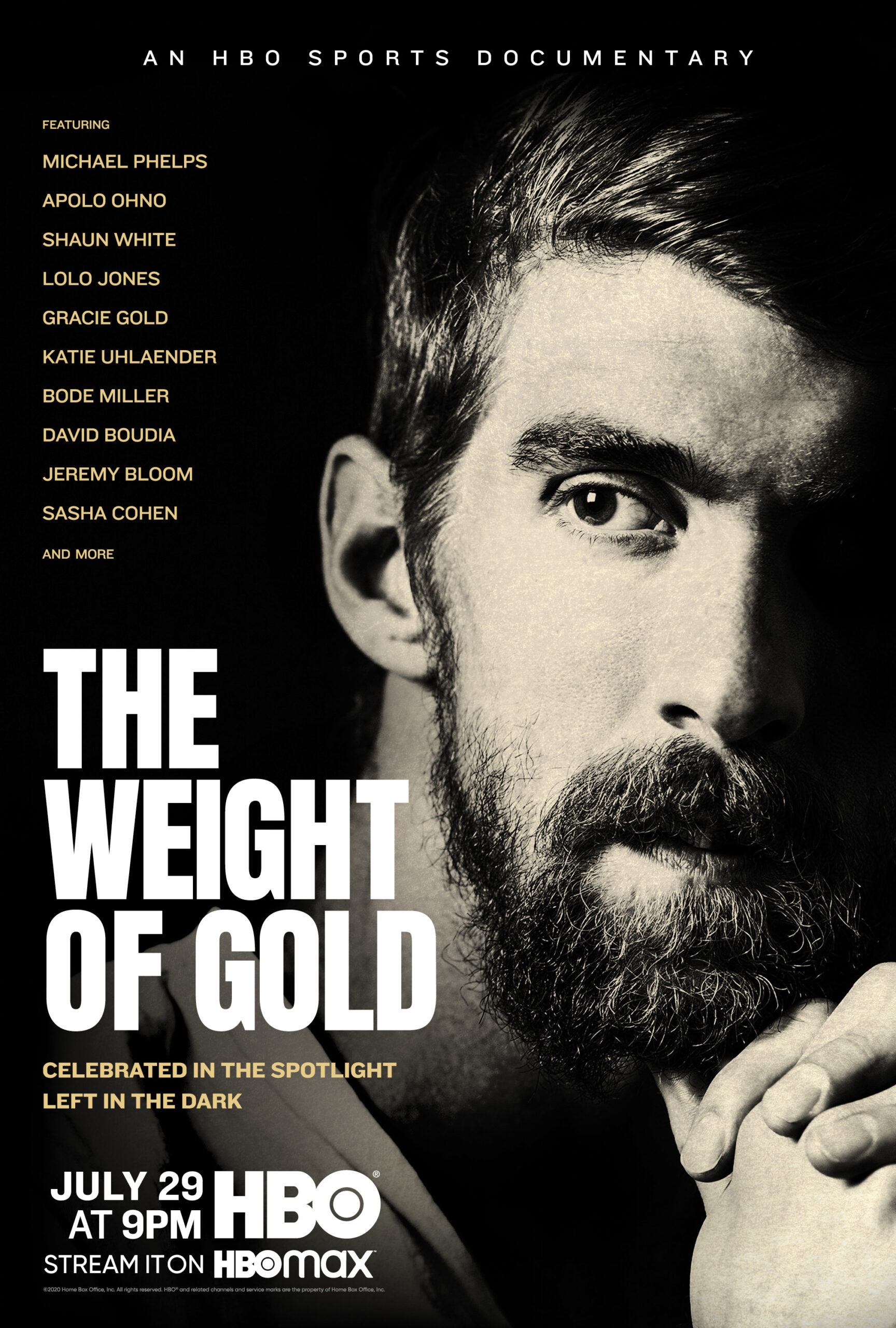
The Weight of Gold, executive produced and narrated by Michael Phelps, premieres Wednesday, July 29 at 9 pm ET on HBO.
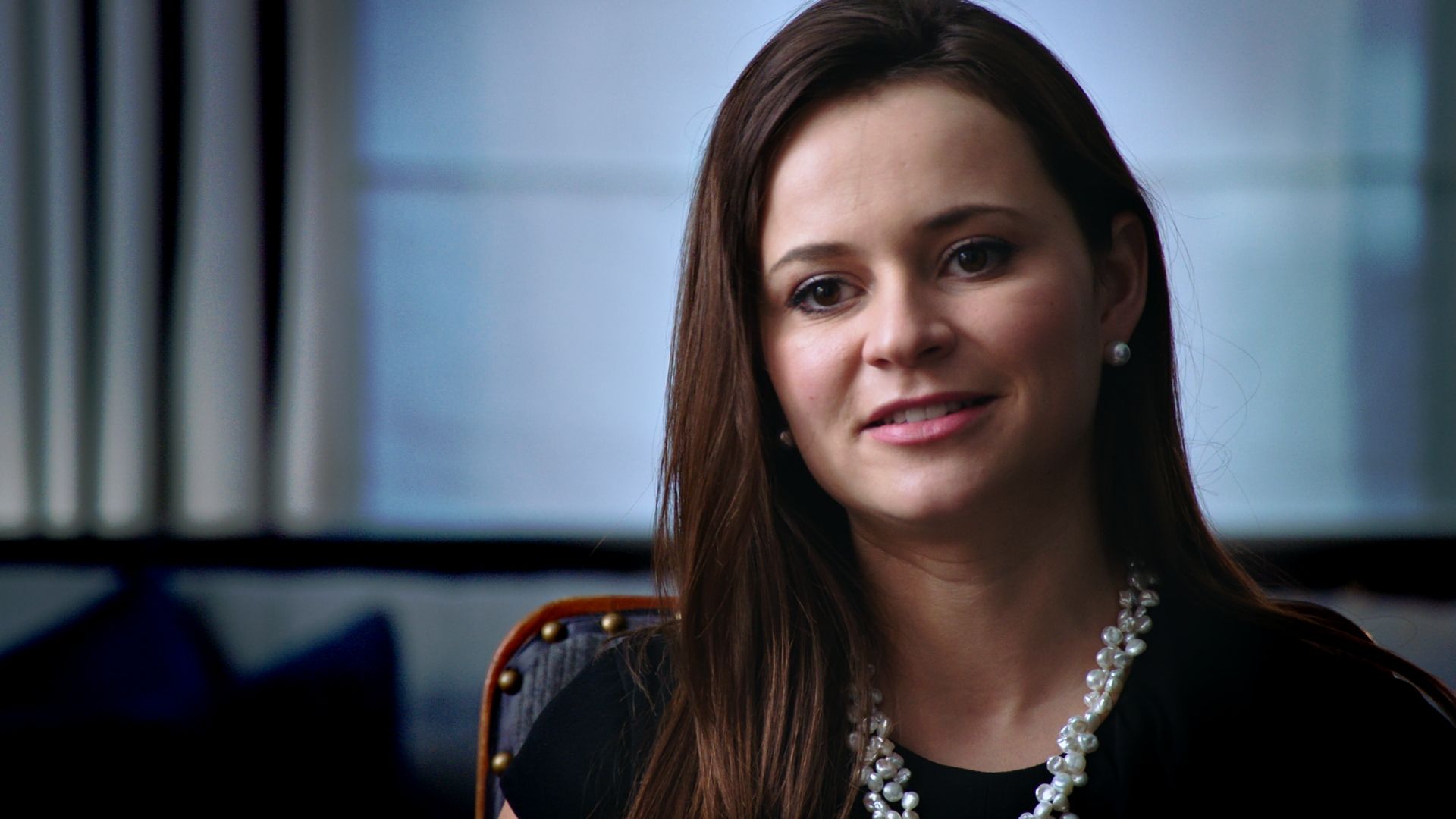
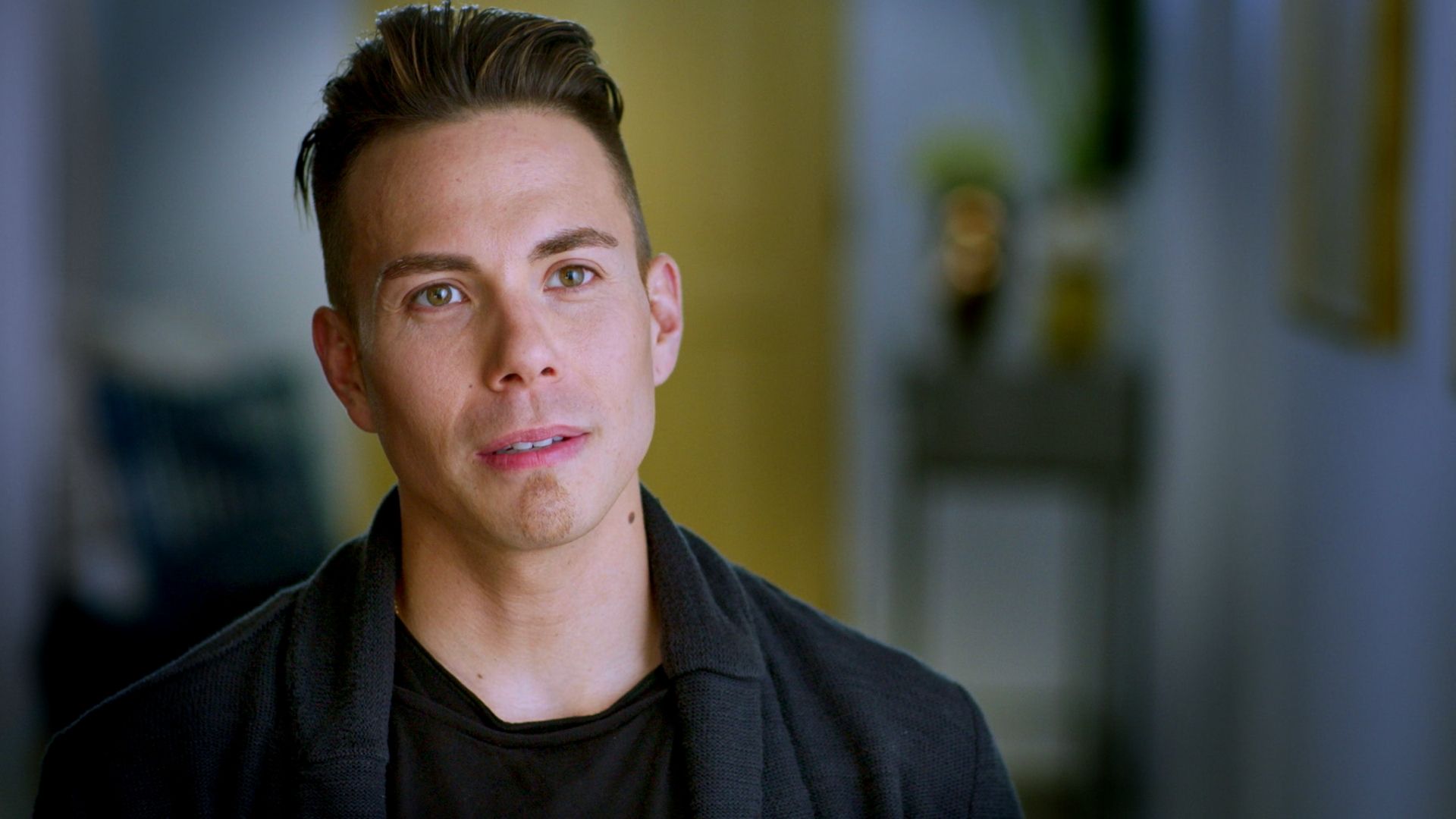
Allison Kugel: I watched your documentary The Weight of Gold, and you really go deep into the emotional effects of life as an Olympian. The public may watch this film and not understand how somebody who has achieved so much can feel such profound unhappiness, because our society loves to equate success with happiness.
Michael Phelps: The hardest thing for me is when friends of mine say something like that to me. My response is I am a human being. I have these feelings just like other people do. People seem surprised when I say that. Speaking for myself, for most of my life I felt like I was not a human being, so until I was able to look at myself in the mirror and see that I was a person and not just a swimmer, that’s when I starting realizing what I was going through, emotionally, and what I was living with and struggling with.
Allison Kugel: Is it safe to say that when you devote your entire life entirely to a single pursuit, you don’t get to know yourself or have the chance to develop that emotional intelligence needed to cope with disappointments or problems as they come up?
Michael Phelps: It’s difficult to start a journey at such a young age when you miss so much of your developmental stages. I was 15 and thrown into a world where I was competing with 30-year-old men and expected not to be a 15-year-old kid, but a grownup. At some point, I just got numb by it all. You train yourself to not pay attention to how you feel, and before too long you are blindsided by it all. And if you do show emotions, you are showing your competitor’s weakness. I could not show that part of myself until the last two years of my career when I got to the point where I really didn’t care what people thought about me. It was at that point where I opened up and decided to talk about the struggles I had been going through.
Allison Kugel: Can you tell me what was your highest moment was? What was your absolute zenith moment in your life when you just felt absolutely high and on top of the world?
Michael Phelps: It had to have been in 2008, after winning 8 gold medals. Achieving that singular goal of doing something no one else has done before. That was the highest point right there.
Allison Kugel: By the way, you are in my refrigerator right now. You’re on a milk carton (Michael is a brand ambassador for Silk plant-based beverages), but for something good. Not because you’re missing (laugh).
Michael Phelps: I love it (laugh)!
Allison Kugel: Can you tell me what the lowest moment of your life was, where you knew you were in trouble?
Michael Phelps: In 2014, getting a second DUI, and not wanting to be alive.
Allison Kugel: Not wanting to be alive, why?
Michael Phelps: Just the feeling of letting so many people down. Leading up to that point I was trying to call out for help, and I did not really know how to call out for help at that time. That was the bottom of my bottom. I was just basically on an elevator headed straight down.
Allison Kugel: Who rallied around you at your lowest moment?
Michael Phelps: Leading up to that rock bottom moment I didn’t have a single person, because I was pushing everybody away and at that point it was the people who cared about me the most that I was pushing away. That would be a handful of friends and family.
Allison Kugel: I remember reading about the drugs and the DUIs in the news and I think as the reading or viewing public, we are all, myself included, guilty of forgetting we are consuming news about a human being. You read about someone who has it all and does something stupid and it makes no sense. The reason it makes no sense is because you don’t really know that person or what their day to day life is about. It is probably isolating for you, being that person, in the public eye that people see as infallible. Is that why you ended up self-medicating, do you think?
Michael Phelps: It is probably part of the reason I did that. I was trying to escape and numb myself, and I was trying to get away from everybody. I think some of the things I did were really my cries for help, and they were looked past. But again, I really didn’t know how to ask for help, and I didn’t want to be rejected if somebody couldn’t or wouldn’t help me. After discovering that a lot of my struggles were based in my childhood and based on my parents splitting when I was very young not really growing up with my dad, I was able to try to tackle that part. I still speak with [my dad] from time to time, but that was a non-existent relationship for so long. We do speak now, but it’s on my terms. Once I dealt with all of that and I got through that, it just kind of got easier.
Allison Kugel: Do you think the media understands the gravity of their responsibility when they are covering people in the public eye, and how it could potentially impact their mental health?
Michael Phelps: I think, like you said, that’s a difficult thing for everybody to see, right? Because we never really understand what people are personally going through. So, I would say it’s a general statement that could be applied across the board and just with journalists.
Allison Kugel: How have your wife and children contributed to your healing process?
Michael Phelps: My wife has been the biggest and most influential person. She has been there for me through some of my struggles. Being together during this quarantine, with so many unknowns for everybody, it’s been some more difficult times, and my wife and I have probably pressed each other’s buttons, but not on purpose (laughs). But we have been fortunate enough to grow and learn together, and that is something I am forever grateful for. I was actually afraid as hell of going through this quarantine process and some of our conversations that have come up, and of becoming vulnerable, but that’s part of growing up and learning. Overall, I think the journey with her is something I can look back on and be proud of how I’ve enjoyed this experience with her.
Allison Kugel: What is your relationship with fame today, as opposed to a decade ago?
Michael Phelps: I don’t know that I have a relationship with fame. For the majority of my career I would say I didn’t really think about it because I was just focused on swimming. Everything else just came along with it. At this point, my wife and I live our lives how we want and don’t really let anything affect that. We are laid back, relaxed people. We don’t go out a lot. We are homebodies, in general, so the quarantine has almost helped us in that respect (laugh). In some odd way, our relationship has benefited even more from it.
Allison Kugel: It’s an introvert’s paradise, right?
Michael Phelps: Yes (laugh)!
Allison Kugel: How do you quell stress and anxiety?
Michael Phelps: I don’t even know how to put it into words. My scariest days are dark. My scary moments, in general, feel like I can’t do anything right. It feels like the whole world is out to get me. On those days it’s almost better for me to fall asleep and wake up tomorrow. That’s how I feel when I have days like that. I know I need to get into the swimming pool. I know I need to get into the gym even more, just because that’s my calming place. Swimming is therapeutic for me and working out is something I do every day because it’s all I know and it’s the only thing I’ve done consistently for 20 years (laugh). Being regimented helps me be my best; that and taking quiet time for myself. That’s one thing my wife and I are both good at. If we aren’t taking time for ourselves, the other one is very pushy about making sure we each take that time. If our glasses aren’t full, we can’t help our three kids.
Allison Kugel: Because of all the Olympic gold medals you have won, people would define you as “great.” How do you define and identify greatness? I ask, because while watching The Weight of Gold, you and other Olympians talk about the price of achieving Olympic greatness, and the toll it takes…
Michael Phelps: Would I change anything? Probably not, to be honest. It is all allowed me to be who I am today. If it had to take me going through some of the scariest moments to look at myself and love who I see today, then it is all okay. I think greatness is a bunch of small things done well. That is really all it is. If you look at any of the greats in history, in sports or whatever, we basically all do it the same way. There is no real rocket science behind it. It is hard work, dedication, not giving up and pushing through. I do think there are healthier ways and smarter ways to do it, and people who see this film or people who are going through these things now, hopefully they can see that there is a healthier way to do it than what we’ve done in the past.
Allison Kugel: When I interviewed Mike Tyson, he told me that you can’t be happy and be great. He felt that at the height of his boxing career he had to sacrifice happiness for greatness. Do you think that is true?
Michael Phelps: I think what he is referring to is that, as an athlete, you are just trying to chase something. That is the biggest thing for a lot of people. I can say for myself, when I retired in 2012, the feeling was, “I need a break. Leave me alone. Stop!” I knew deep down inside I still wanted to come back because I was frustrated with how I finished, and I wanted to finish on my terms. That’s why I came back. When I was swimming or when I retired in 2016, I felt I did everything that I could, and I did what I was meant to do in this sport. For the longest time, I saw myself as strictly a swimmer and just this kid who went up and down staring at a black line [in a swimming pool] and not a human being. That’s that feeling of trading happiness for greatness you are referring to. I didn’t like who I saw in the mirror when I was like that.
Allison Kugel: Do you think you ever bought into the notion that you were superhuman or a superhero, at all?
Michael Phelps: No because I just wanted it that bad. It was always more of a wanting and striving. Going into 2008, that was just… me. When I become super focused on one thing, it’s that and only that. I’m a competitor, and I’m the biggest competitor you will ever see. It’s that blood in the water mentality. At that point in my life, when I wanted something bad enough, I was going to outwork every single human being, no matter what it took.
Allison Kugel: How would you say your mental health is today?
Michael Phelps: Today, meaning over the last couple of months (laughs)?
Allison Kugel: Well, all of us are having some issues these last couple of months (laugh).
Michael Phelps: I will say this, I did a piece with ESPN three months ago and it was a disaster. Yes, I have ridden a roller coaster of emotions over the last six months, as I’m sure we all have. But all in all, honestly today I don’t think I could be in a happier place. I probably have one or two bad days a month that are a 6 or 7 on a scale of 1 to 10, whereas before, it would be 10 bad days a month that was at a 9. Quarantine has also forced me to learn and to grow. I almost feel like that is what this is all about. Whether it’s the work that my wife and I have done, or work on myself, I’ve broken through some barriers. It’s almost been good for me to have this time, not to, like, sit in my own shit (laugh), but to deal with myself. I feel like everything in life happens for a reason.
Allison Kugel: I understand what you mean. It is scary but necessary to be still, and we’ve all had to be still in recent months.
Michael Phelps: It’s been fun though. It was scary in the beginning, but if we can all take a step back and look at the beginning of the quarantine process, I bet we can all see how much we’ve learned and grown through the process without even realizing it. It’s kind of crazy that I have worked within hundredths of a second as a competitive swimmer my entire life, and now I’m trying to slow life down.
Allison Kugel: That’s interesting. You’re really not used to that.
Michael Phelps: No, not at all (laugh).
Allison Kugel: Are you completely sober today? Have you sworn off alcohol?
Michael Phelps: We don’t drink in our household at all. There are some bad childhood memories of my father [drinking] or seeing other things like that. I’m somebody who is very conscious of not having my boys go through some of the same things that I lived through and had to see. It’s hard to still live with some of those feelings, even 20 years down the road. When I was a kid my dad didn’t know how to handle certain situations. I feel like at times I get very irritable in certain situations because of it, and I’ll go back to my childhood self and realize, “Oh, this is probably why I’m feeling this way right now. It’s because of something that scared me from my childhood and this situation is kind of poking at something.” I have to take a deep breath and be still with it. That is what I teach my sons. When you feel overwhelming emotions you just have to take a second to realize what they are. [Without alcohol,] I have had to process those emotions that have come up from my childhood.
Allison Kugel: In this documentary film, The Weight of Gold, you appear in, narrate, and you also executive produced, you show a darker side of the Olympics and Olympians? Are you at all nervous about how the International Olympic Committee will react to the film?
Michael Phelps: This is a project that I was super pumped and excited about it. Honestly, after coming off of the 16 Olympic games, being able to see that there are so many other athletes that are going through something just like what I went through, I feel strongly that something has to be done about it. Athletes along with myself want to help make a change and I was very fortunate to have 20 athletes jump on board this film. Since then, we have had even more athletes open up about their experiences. The film is very real and raw. We are going to have to change this dynamic if we want to see everything continue to grow in Olympic sports.
Allison Kugel: What change do you hope to see because of people watching this documentary?
Michael Phelps: I hope people take our mental health just as seriously as our physical health and athletic ability. If [the powers that be] care so much about our physical well-being, then our mental well-being should be a part of that equation. If our mental well-being isn’t there, then our physical well-being won’t be anywhere close to our potential. They both go hand-in-hand. Right now, mental health resources and support is not there, and it has never been there. I guess if we were not performing, then we don’t get the help we need.
Allison Kugel: And you start to feel like a prize racehorse.
Michael Phelps: Like a product. You see in this film there are thousands of kids that are waiting to take our shoes, and as soon as we are done the door slams on us and we are forgotten about it. Personally, I have been extremely fortunate. Yes, I struggle mentally but my performances have allowed me to continue to do things where other people are still potentially not getting a job because they’ve forgone college, they’ve forgone their whole life to put into this.
Allison Kugel: Would you let your kids be professional athletes or take on the kind of the kind of journey that you took on?
Michael Phelps: I don’t think it’s fair for them to have to follow in my footsteps. If they are going to be 100 times better than me, than hell yes! I would love to see it. I would love to be there and be a part of it if they love it. but I don’t want to force them into something they don’t want. I found swimming as a kid and loved it. I did have some rocky points, but I absolutely enjoyed every moment. I want them to follow their passion and love what they do.
Allison Kugel: What do you think you came into this life as Michael Phelps to learn, and what did you come here to teach?
Michael Phelps: I think I have partially found some of it, but I don’t think I’ve figured out all of it. I do think this next chapter of my life is going to be way bigger than what I have ever done before. I think bringing awareness to the mental health side of things could potentially be bigger than my swimming ever was. I don’t think that is the whole picture, and I don’t know what the rest of the picture looks like yet. Isn’t life’s purpose to continually be finding out what it is, but we are never supposed to really find out what it is while we are living it?
Allison Kugel: I like that.
Michael Phelps: If you obsess over your purpose too much then it almost becomes irrelevant and obsolete. It should naturally just occur over time. I don’t know exactly what my life’s purpose is because I feel like I am still trying to find it. I might not fully know, but I feel like it’s not something I can go out and search for. It will be presented to me whenever it is ready to be presented.
Allison Kugel: I get that.
Michael Phelps: I am still trying to process what happened over the last 16 years. The one thing for me throughout my career was that I was always visualizing my next goal, and that is important. I was always prepared for what was going to happen, but I was never future tripping. I try to live in the moment as much as possible. And now, that is something I am trying to do outside of the water. I feel like I have probably taken more strokes in the water than I have taken steps on land.
Photos Courtesy of HBO Sports.
Allison Kugel is a syndicated entertainment columnist and author of the memoir, Journaling Fame: A memoir of a life unhinged and on the record. Follow on Instagram @theallisonkugel and at AllisonKugel.com.


